Safe In Hell
SAFE IN HELL at the Yale Rep
by Edmond Chibeau
12 November – 3 December 2005
Theatre repeats itself; the first time as tragedy, the second time as farce.
Amy Freed’s “Safe In Hell” has many elements of a Greek Tragedy, and can not help be compared to Arthur Miller’s 20th Century tragedy, “The Crucible.” “Safe in Hell” is written as a comedy yet it touches us, often when we least expect it, in ways that a knock-about farce could not do. Perhaps we should use the oxymoron “tragicomedy” to describe it.
To succeed a play must operate on several levels at once. Not only does Freed’s play take a few slams at the Bush administration and the Oedipal drama that is lighting up the sky over Iraq and leaving New Orleans in darkness, it also looks at the themes of ambition and the absurdity of blind faith.
The Puritans believed in a spiritual baptism, a privileged moment when they saw the meaning of their faith, when the spirit of the Lord filled them and set the course for the rest of their lives as a Christians.
Early in the play we see a discussion between Cotton Mather and his father Increase Mather. It becomes clear the son has not yet had the conversion experience. It is a sequence of considerable tension between the two clerics. It is played for laughs but it is the hinge on which the rest of the play swings.
In a few sentences the father realizes that his son does not have the discernment, misericordia, or other spiritual gifts to be a spiritual leader. Increase, sees his son’s failing when the son tries to claim he that he has experienced the transcendent moment; that he can feel it when he creates fear in the congregation. His father lets him off the hook. Increase has too much compassion to confront his son’s shallowness.
In this scene the playwright lets us ask, “What might have been?” What if Increase had not sent his son to pursue the Salem witch trials? We can imagine King David, or George Bush or Increase Mather crying out in despair, “Absalom Absalom!”
Amy Freed is a poet. She gets down to the molecular level of language. She doesn’t simply communicate her insights, but does so in a language that is rich with sound and makes it easier for the actors to perform the psychological insights she offers. Poetry in the theater is not necessarily strict adherence to end line rhyme or metrical scansion. It is using the devices of poetry to serve the ends of the play. Amy Freed has an ear; assonance, consonance, internal rhyme, metrical rhythm and the breaking of that rhythm with caesura are among the tools she uses to bring us her play.
These elements are not there to draw attention to themselves but are hidden within the text to help the actors sing the song of meaning. We don’t really see them but we can feel their traces throughout the work.
There any number of characters who could be brought to the fore and it would be impossible to adequately represent them all in two hours. But if they are going to be brought forward at all then they must either drive the narrative forward or provide a significant sub plot.
The European who took on the traits of the Nipmunks is a fascinating character but is not developed enough to contribute to this work. Why did he choose to live as a native? How is he perceived by the Nipmunks?
The minister who died reciting the Lord’s Prayer played an important part later in the play but his early appearances did not involve us in his life enough to deeply feel his scenes at the end of the evening. Amy Freed is a highly skilled professional and should be held to the highest standards. The play is so good that a viewer wants it to be perfect.
It is hard to imagine a script more fully served by a production team. Yale Rep did a great job in bringing together excellent actors, a set that was complex and interesting, costumes, puppets, masks and interstitial music that all worked admirably. The characters were quirky individuals but the actors worked as a team; each playing off the others to create a unified whole.
The director’s art is a difficult one to notice but this ensemble is so finely tuned and the production so perfectly pitched that we must give credit to the hand that helped shape the performances. Part the director’s job it so make sure everyone is on the same page emotionally, interpretively, and in terms of pace and timing. Mark Wing-Davey delivers the letter.




